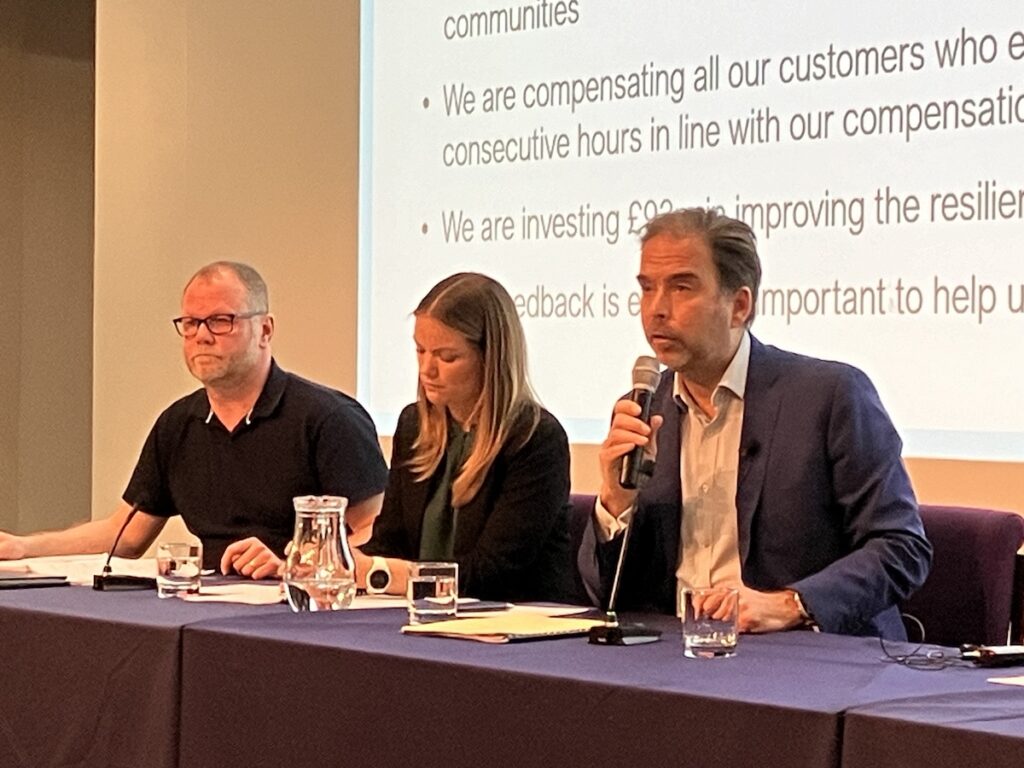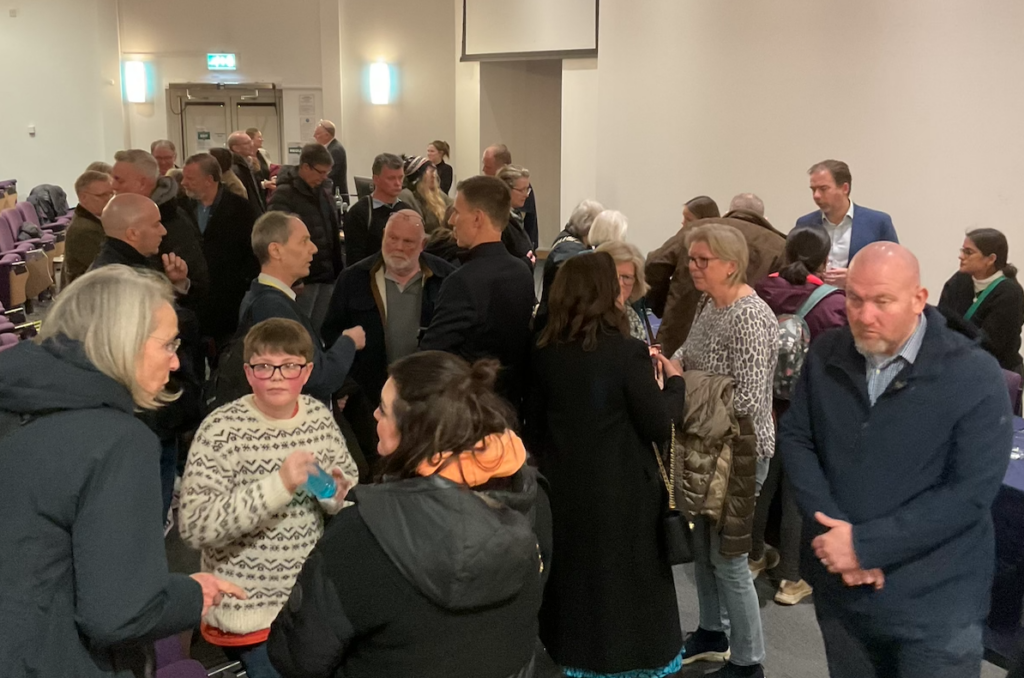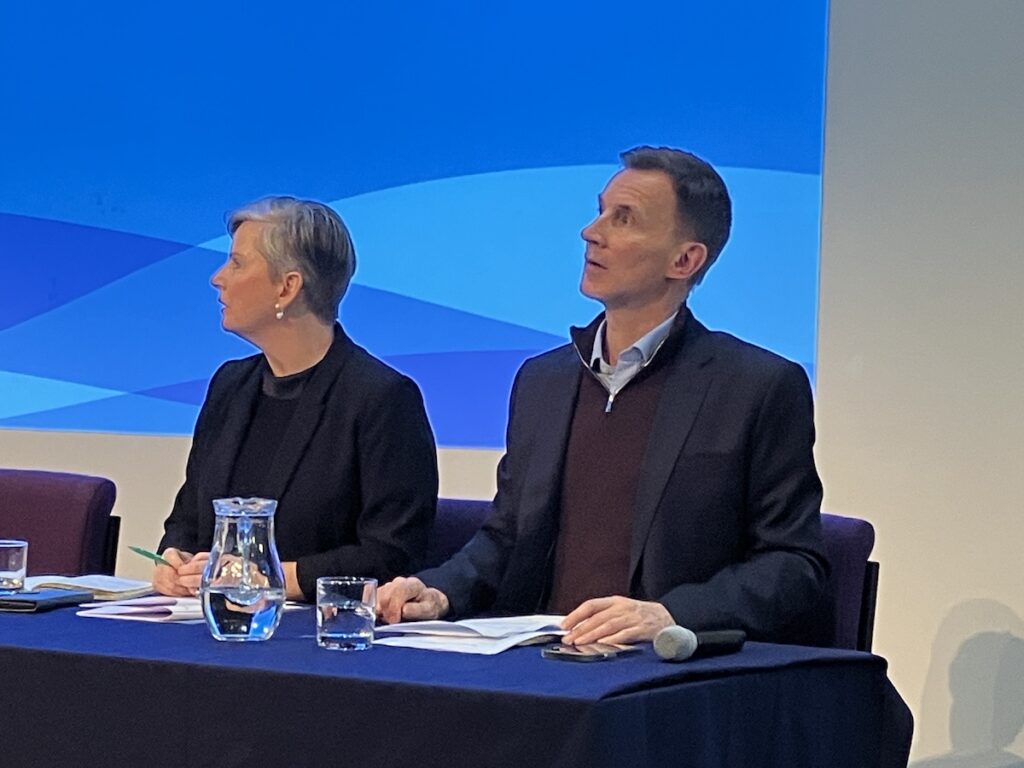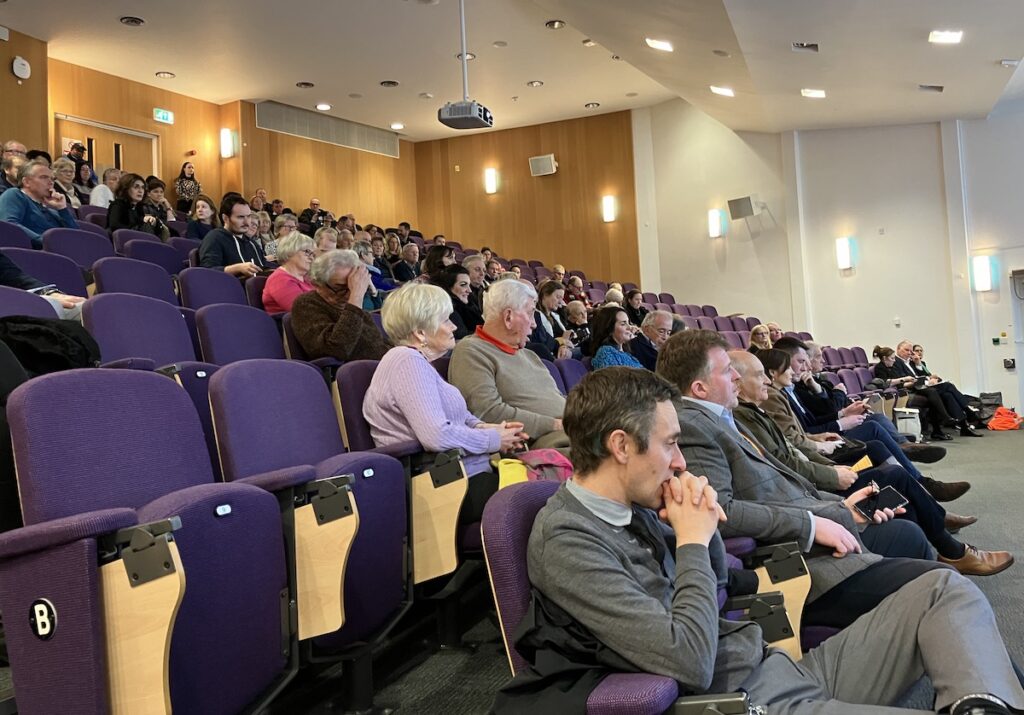 Abraham Lincoln
If given the truth, the people can be depended upon to meet any national crisis...
Abraham Lincoln
If given the truth, the people can be depended upon to meet any national crisis...
 Guildford news...
for Guildford people, brought to you by Guildford reporters - Guildford's own news service
Guildford news...
for Guildford people, brought to you by Guildford reporters - Guildford's own news service
Thames Water Representatives Face Angry Residents Who Suffered Loss of Water Supply
Published on: 17 Dec, 2023
Updated on: 18 Dec, 2023

Thames Water representatives (left to right), Paul Wetton, water director, Sarah Holland, director of operations, service and control, and Alastair Cochrane, interim CEO and CFO.
By Martin Giles
Apologetic representatives from Thames Water faced angry residents at a public meeting on Friday evening (November 15).
They heard face-to-face comments from about 120 Guildford and Waverley residents affected by the water outages in November and answered questions about the causes of the incident, which hit 13,000 homes and businesses which lost water supply for between two and seven days, and compensation payments.
The meeting was opened by Guildford’s MP, Angela Richardson, and chaired by Jeremy Hunt, the MP for South West Surrey, who had arranged the meeting at the University of Surrey. Paul Follows, the leader of Waverley Borough Council, and other councillors from Waverley and Guildford also attended.
The South West Surrey MP, thanking the three TW representatives for “entering the lions’ den”, said local residents were angry with Thames Water because “…it felt like there was little or no resilience in our water supply and the way the communications happened really undermined trust.”
As an example, he named one resident, Joanne Gallagher, who didn’t have water for six days and had just received £30 pounds in compensation. There was a lot of frustration, he said, “particularly about way the website works, telling people that the issue was fixed when, I think, there were still 1,300 homes without supply.”
Then describing some of the impact of the major incident, Mr Hunt said: “60 Special measures had to be taken very very quickly to protect the two hospitals in the patch. Lots of local businesses lost £1,000s in lost business training, The Star in Witley lost £10,000 pounds on one day. Many registered vulnerable did not receive the offers of bottled water and had to rely on families and friends. And some went several days without central heating or hot water.”
Responding, Alastair Cochrane, an interim CEO at Thames Water, said: “Let me start with ‘sorry’. We owe you a huge apology for the inconvenience the disruption.
“The most important thing we do as a water company is ensure a consistent supply of high-quality water. That is our number one priority. We are a public health organisation and, frankly, failed in that Call of Duty to you. It’s quite clear we need to do much better as a business, as a company.”
How it happened
The meeting then heard Paul Wetton, water director, explain that the problem had started on November 2 when power fluctuations affected water abstraction rates in some water treatment plants (WTPs). This problem was compounded by high “turbidity” (high levels of particles in the eater making it cloudy) with clogged filters at Shalford WTP, a critical plant in the local water supply network.
As reservoir levels dropped or quality could not be assured, water supplies to homes stopped.
Although the treatment plants did have uninterrupted power supplies, in case of power cuts, they did not have sufficient power to maintain all the processes.
And when pressed on this Mr Wetton said he couldn’t guarantee that problems caused by power fluctuations wouldn’t happen again. Mr Hunt said later: “The fundamental thing we want to know is how we are going to make sure that the same thing doesn’t go wrong again, I don’t think we got the full answer to that.”
Communications
Sarah Holland, director of operations, service and control, started by telling the audience that Thames Water’s response to the major incident “fell well short of your expectations and what you deserved. And we are absolutely sorry about that. And committed to learning.”
She continued: “I think there’s no way of dressing this up. What we provided was sparse, it was on occasion inaccurate. On occasion, it felt like we just copied and pasted what we’ve done previously and I don’t think it did justice either to what you deserve to hear as customers or actually top the hard work that our teams were actually doing to try to get the supplies.
“I think [we need] to make sure that not only you’re getting timely, and accurate [information], but that it’s also consistent with the information that everyone else is receiving.”
Improving resilience
Alistair Cochran, who as well as being the interim Co-CEO is Thames Water’s chief financial officer, explained that £4 billion was to be spent on improvements across the whole of the company’s area of responsibility in the next few years and, if the regulator approves it, there would be a further 40 per cent increase in investment. He said this would help them improve the resilience of their assets, and operational performance.
Before the incident, Thames Water announced plans to invest £93.1 million to tackle Guildford’s “water island” situation in which piped backup supply from outside the area is impossible.
The money will be spent on an east-west water pipeline and at water treatment plants including Shalford, Ladymead, Netley Mill and Mousehill.
Compensation
There were several questions to the panel regarding compensation, including when it would be paid and how it would be calculated. One questioner asked was it true that TW had turned supplies back on periodically in order to prevent the 12-hour lack of supply periods triggering compensation liability being reached.
Ms Holland said that the company did simply not have the ability to do that even if it wanted to but all complaints would be considered.
See Thames Water’s Customer Guarantee Scheme here.

At the end of the meeting members of the audience came forward to speak to members of the panel. Ten-year-old Fraser, who asked about the use of plastic bottled water, can be seen bottom left in the patterned jumper.
Use of plastic bottles
The youngest member of the audience, Fraser, aged 10, was concerned about the amount of plastic waste resulted from the use of the emergency bottled water supplies. Would they be offset?
Ms Holland said bottled water was preferred to other solutions such as standpipes because they would not compromise on the quality of water that customers receive but that they were looking at alternative options.
Scrutiny
At the end of the meeting, Angela Richardson accepted that it was her and Jeremy Hunt’s job to scrutinise the measures being taken by Thames Water and also the role and effectiveness of the regulator Ofwat.
See also:
Guildford’s Water ‘Island’ To Be Linked Up – CEO ‘Acutely Aware’ of Disruption Caused
Thames Water Gives More Detail of Causes of Water Outage Incident
Responses to Thames Water Representatives Face Angry Residents Who Suffered Loss of Water Supply
Leave a Comment Cancel reply
Please see our comments policy. All comments are moderated and may take time to appear. Full names, or at least initial and surname, must be given.Recent Articles
- Letter: I Would Rather Have Potholes Filled
- New Parish Councillor Says Funds from Developers Must Benefit the Local Community
- Tests at Paddling Pool Showed Water Was Too Alkaline, Says GBC
- Letter: Our Residents Want CIL Money Properly Used for Infrastructure Without Delay
- Charity’s New Programme Meets Needs of SEND Children Without School Places
- Pasta Evangelists to Open First Restaurant Outside London – Right Here in Guildford
- Police Seek Witnesses to Park Barn Assault
- Notice: Rosamund Community Garden
- Village School Set to Close Due to Falling Birth Rate
- Letter: Waverley’s Management of CIL Money Is Morally Questionable


Recent Comments
- Warren Gill on Millions of Taxpayer Money Recovered from Railway Fare Dodgers
- Roshan Bailey on Public Asked for Views on SCC’s Proposal for Reduced Speed Limits
- R Wong on Letter: Our Residents Want CIL Money Properly Used for Infrastructure Without Delay
- Nigel Keane on Village School Set to Close Due to Falling Birth Rate
- Patrick Bray on Public Asked for Views on SCC’s Proposal for Reduced Speed Limits
- Mark Percival on Public Asked for Views on SCC’s Proposal for Reduced Speed Limits
Search in Site
Media Gallery
Dragon Interview: Local Artist Leaves Her Mark At One of England’s Most Historic Buildings
January 21, 2023 / No Comment / Read MoreDragon Interview: Lib Dem Planning Chair: ‘Current Policy Doesn’t Work for Local People’
January 19, 2023 / No Comment / Read MoreA3 Tunnel in Guildford ‘Necessary’ for New Homes, Says Guildford’s MP
January 10, 2023 / No Comment / Read More‘Madness’ for London Road Scheme to Go Ahead Against ‘Huge Opposition’, Says SCC Leader
January 6, 2023 / No Comment / Read MoreCouncillor’s Son Starts Campaign for More Consultation on North Street Plan
December 30, 2022 / No Comment / Read MoreCounty Council Climbs Down Over London Road Works – Further ‘Engagement’ Period Announced
December 14, 2022 / No Comment / Read MoreDragon Interview: GBC Reaction to the Government’s Expected Decision to Relax Housing Targets
December 7, 2022 / No Comment / Read MoreHow Can Our Town Centre Businesses Recover? Watch the Shop Front Debate
May 18, 2020 / No Comment / Read More















Peter Mills
December 18, 2023 at 10:30 am
I could not make the meeting, but according to this account, it wouldn’t have been a great use of my time anyway. What did it achieve? Seems pretty pointless.
Michael Bruton
December 18, 2023 at 11:20 am
Perhaps Ms Richardson would like to involve herself in the Horsleys and Clandons which will be part of her new constituency. And where, thanks to Tory GBC policies, there are zero Tory councillors?
She appears to have been somewhat sotto voce to date regarding the appalling application regarding Wisley.
Ian Macpherson
December 21, 2023 at 12:24 pm
I didn’t know there was a public meeting. How was it advertised? I have read about other events after they have happened. Is there a case for a Guildford notice board or email-out for significant public authority events of this kind, or is there already one and no-one has told me?
Meanwhile, with the meeting called by the two Conservative MPs, I might have also expected some sort of mail-out by the local party office, even if only of a self congratulory nature. It keeps very quiet despite an election being in the offing.
I am however grateful for the initiatives shown by Mr Hunt during the crisis.
Editor’s comment: The meeting was trailed extensively in our news articles from the time it was first proposed to details being made available (see:https://guildford-dragon.com/details-of-mp-organised-public-meeting-with-thames-water-announced/). I believe it was also advertised on social media.